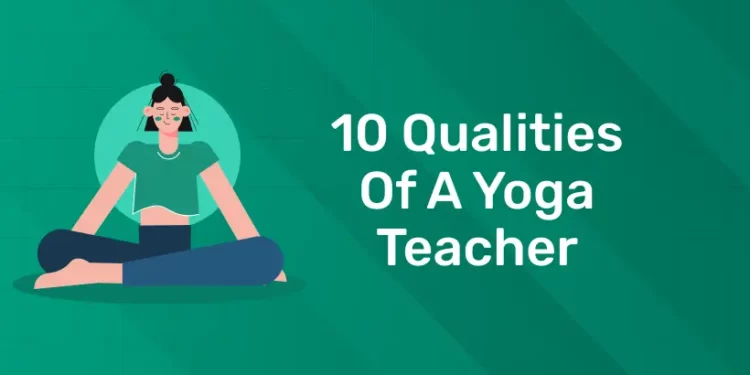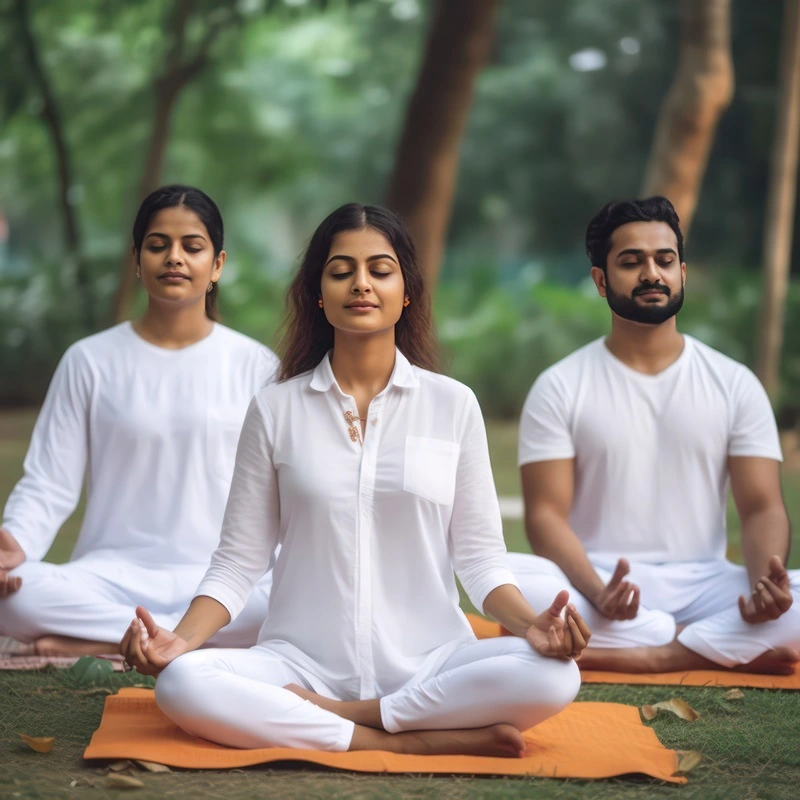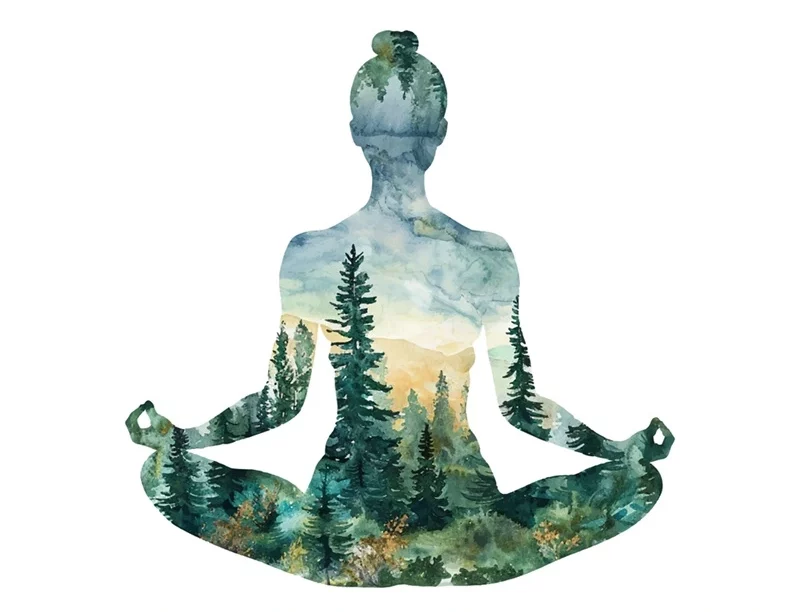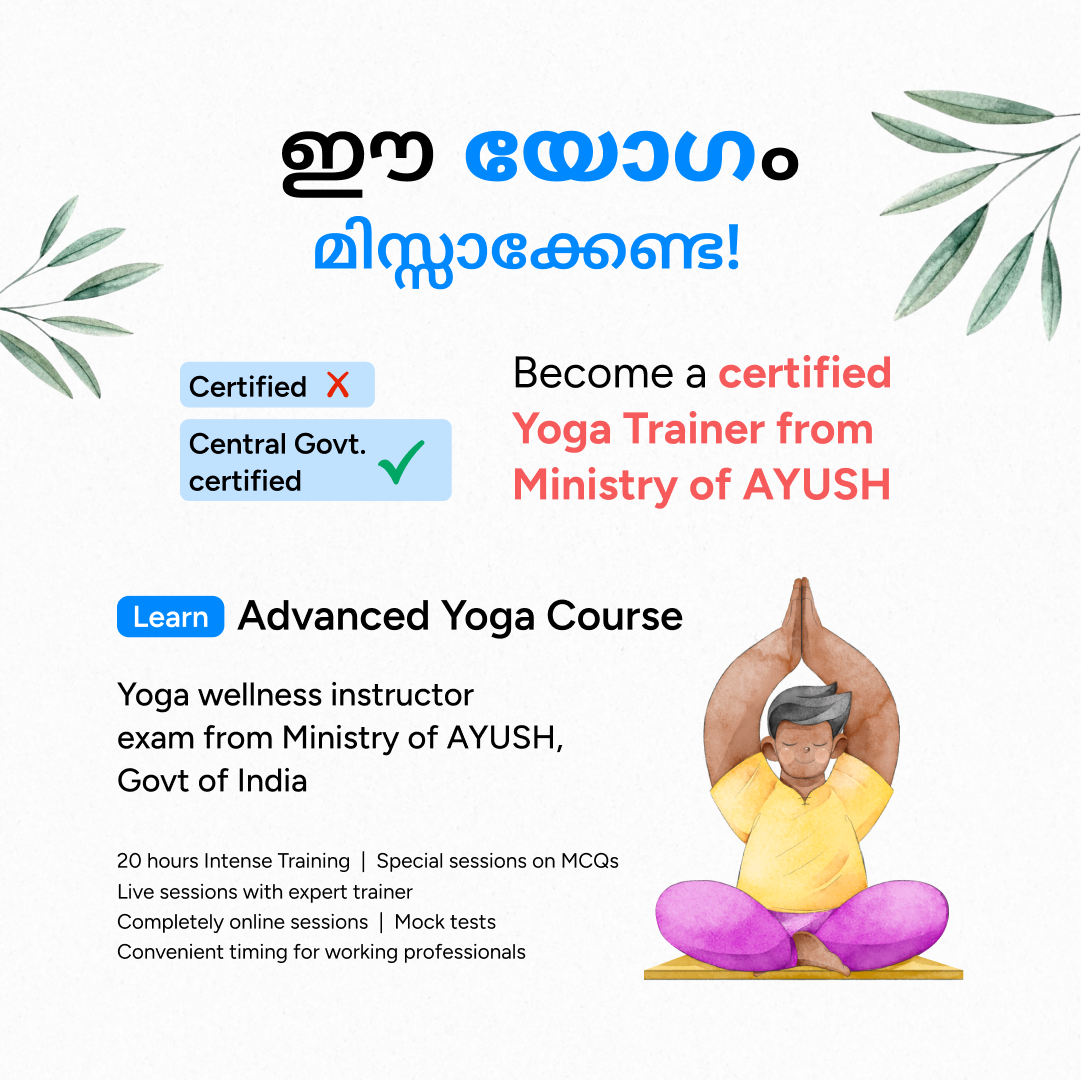Table of Contents
In a world increasingly turning to holistic wellness, yoga has emerged as more than just a physical practice. It’s a lifestyle, a philosophy, and for many, a path to self-discovery. But behind every meaningful yoga journey is a great teacher. Whether you’re considering a career in yoga instruction or simply curious about what sets a teacher apart, this post outlines the 10 most essential qualities of an exceptional yoga teacher.
Get Certified, Get Confident! Join Our Yoga Teacher Training Course!
Qualities of a Yoga Teacher
Teaching yoga is one of the most rewarding career possibilities. Yoga could only be taught one-on-one by a teacher in the past. To prepare oneself to hold space for others, a significant amount of responsibility and genuine commitment are required.
1. Knowledgeable and Informed
Good yoga teaching requires deep understanding of anatomy, alignment, and yoga philosophy. Skilled yoga teachers use their knowledge to safely and smartly guide students through the poses and sequences of the practice. They keep broadening their knowledge to improve their teaching skills by staying up to date with the latest research and developments in the yoga world.
Mastery of asanas, pranayama, and philosophy, like Patanjali’s Yoga Sutras, builds credibility. Teachers trained in Kerala’s Ayurvedic traditions can weave holistic insights into classe
2. Compassionate and Empathetic
As a yoga teacher you need to be kind, understanding and sensitive to your students to create a supportive and encouraging environment where they feel heard, seen and encouraged on their yoga journey. These qualities are needed to create a sense of community and connection in the yoga class and to promote growth and trust.
A great teacher feels your struggles, whether it’s a tight hamstring or a heavy heart. They create a safe space, who notice a student’s hesitation in Downward Dog and offers a gentle modification with a smile. Empathy means understanding diverse needs, physical, emotional, or cultural. This quality builds trust, encouraging students to return. Aspiring teachers can practice active listening, asking students about their goals to foster connection.
3. Patient and Supportive
In yoga teaching patience is a virtue as growth on the mat often requires patience and perseverance. Yoga teachers who are patient know each student’s path is unique and personal and provide thoughtful direction and support. By acknowledging and celebrating their students’ achievements they help them build self confidence and self belief.
As a yoga teacher you need to be kind, compassionate and encouraging to create a safe, caring space where students can explore and progress in their practice. This requires patience and support. These qualities are needed to create community, growth and trust in the yoga class.
4. Adaptable and Flexible
Yoga teachers need to be adaptable to meet the different needs and abilities of the students. They should be skilled at customising and modifying their teaching to suit different body types, levels of fitness, and conditions. A Bengaluru teacher might offer chair yoga for seniors or vigorous flows for athletes, tailoring each class.
Adapting to hybrid models, blending in-person and online sessions, is crucial. A Chennai studio leader streaming classes on YouTube ensures access for rural students. Adaptability also means embracing trends like yoga for stress relief. Aspiring teachers can experiment with modifications and platforms like Instagram Live to reach wider audiences.
5. Self-practice and self-study
All yoga teachers should practice yoga before teaching others. To mentor others, one needs to have experience. Before teaching others the teacher must practice on the mat because experience is better than intellectual information. A good yoga teacher should keep up with new methods and attend training programs. A yoga teacher should inspire their students and have a genuine curiosity to learn new things. Even if they are expert in one style, learning about others and incorporating them into their teaching can be very helpful.
Self practice and self-study complement each other and give yogis opportunities for introspection, growth, and integration of yoga in daily life. A comprehensive practice, a deep understanding of yoga, and a connection with oneself and the world can be cultivated by those who practice both self-practice and self-study.
6. Clear Communicators
Yoga teachers must communicate well to give instructions, cues and advice clearly and concisely. They make sure all students can understand and follow their instructions by using inclusive and simple language. Open communication strengthens the bond between student and teacher and overall yoga experience.
Yoga teachers need to be good communicators to teach, mentor and explain to their students. Active listening and feedback are essential for communication to happen. Teachers need to listen to the questions, comments and feedback from their students to resolve any issues or misunderstandings in a timely and polite manner. Instructional strategies and cues need to be tailored to each student’s unique needs and preferences for clear communication.
7. Authentic and Genuine
Since students are attracted to teachers who are real and genuine, authenticity is key to teaching yoga. Genuine passion radiates, making students feel home. A Varanasi teacher sharing their journey from burnout to balance through yoga inspires trust.
Authenticity counters the polished noise of social media, with students craving real connections. For instance, a Kolkata instructor posting raw, unfiltered practice videos on Instagram builds a loyal following. This quality fosters vulnerability, encouraging students to open up. Aspiring teachers should reflect on their “why” for teaching, letting it shine through every class.
8. Inspiring and Motivating
In yoga teaching, inspiration is a powerful tool because it inspires and motivates people to be their best. By igniting their curiosity, passion, and commitment to the practice, inspiring yoga teachers empower their students to take on new challenges and opportunities on the mat. They help students build self-confidence by offering words of encouragement and support.
A teacher’s calm, grounded energy sets the tone, like a candle in a stormy night. A Goa retreat leader’s serene vibe during meditation inspires students to carry mindfulness off the mat. Presence shines in digital spaces, like a Rishikesh guru’s focused aura on Instagram Live. The quality transforms classes into sanctuaries. Aspiring teachers can cultivate presence through daily meditation and mindful interactions.
9. Mindful and Present
Since mindfulness develops present moment awareness and strengthens the mind-body connection, it’s essential to good yoga teaching. To help students develop an inner sense of balance and calm, mindful yoga teachers guide them to awareness of their breath, feelings and thoughts. By bringing mindfulness into every aspect of the yoga experience they provide a space for students to play with mindfulness techniques on and off the mat.
A mindful teacher pays attention to every detail of their teaching, from verbal cues, adjustments and encouragement to walking students through poses and sequences. They are a visible, helpful presence, sensitive and aware of the needs, experiences and energies of the students.
10. Continuously Learning and Growing
Yoga evolves, and great teachers evolve with it. Yoga Alliance workshops on restorative yoga stay relevant, offering fresh techniques. Continuous learning includes studying trends like AI-driven wellness apps or yoga for anxiety. For example, a Pune teacher learning Sanskrit chants deepens cultural connections. This quality keeps classes dynamic, attracting curious students. Aspiring instructors should join online courses or read texts like the Hatha Yoga Pradipika to stay inspired.
Discover the Art of Teaching Yoga – Join Our Teacher Training Program!
Tips for Aspiring Yoga Teachers
1: Which of these is the primary goal of yoga practice?
Ready to embody these qualities? Here’s how to shine in India’s yoga scene:
-
Deepen Your Roots: Train at a renowned institute like Entri for authentic expertise.
-
Practice Heartfelt Cues: Teach friends first, refining clear, warm instructions for poses like Tadasana.
-
Go Digital: Stream classes on Zoom or Instagram Live, reaching students from Kerala to Canada.
-
Foster Connection: Host free meditation circles or WhatsApp groups to build community.
-
Stay Curious: Explore trends like yoga for mental health via online workshops or books like “Light on Yoga.”
These steps, inspired by India’s yoga pioneers, help you inspire and connect.
Become a Certified Yoga Instructor
Yoga Teacher Training Course by Entri App: Master authentic yoga techniques, earn certification, and build a successful career as a professional yoga instructor.
Join Now!Conclusion
These ten characteristics define a quality yoga instructor. A competent yoga instructor should be deeply passionate and respectful of the practice of yoga in addition to possessing expertise and knowledge in it. In yoga, there is no place for ego. Yoga instructors should be sensitive to the needs of each student and have a desire to see others progress through the practice. In addition to being an effective communicator, a yoga instructor should be enjoyable and lively. Acquiring a student’s trust is also crucial. Thus, in order to be effective and motivating for the improvement of both yoga practitioners and oneself, a good yoga instructor needs to have these attributes.
Interested in deepening your yoga practice or becoming a certified yoga instructor?
Explore Entri’s Yoga Teacher Training Program, designed to blend ancient wisdom with modern tools, delivered by expert mentors.
Become a Certified Yoga Instructor
Yoga Teacher Training Course by Entri App: Master authentic yoga techniques, earn certification, and build a successful career as a professional yoga instructor.
Join Now!Frequently Asked Questions
How can yoga teachers inspire their students?
Yoga instructors that are enthusiastic and passionate about the practice can motivate their students. When instructors demonstrate their passion for the practice, it inspires students to routinely practice and discover the advantages of yoga for themselves.
Why do yoga teachers need to keep learning?
Yoga instructors must never stop learning in order to advance their craft, just like students do. Learning keeps educators abreast of new concepts and methods, which improves the effectiveness and interest of their lessons.
What is the quality of a yoga teacher?
A skilled yoga instructor is organised, but they are also adaptable in their teaching methods and sequences to accommodate students with varying skill levels. By thinking beyond the box, you may assist your students’ sequences become more flexible and creative.
What skills do you need to be a yoga instructor?
- the ability to create courses and teaching expertise.
- abilities in providing client service.
- independence in your work.
- capabilities as a leader.
- should focus on the details and be meticulous.
Why is authenticity important for yoga teachers?
Since it fosters connection and trust with students, authenticity is essential to teaching yoga effectively. The free sharing of personal experiences and vulnerabilities by genuine yoga instructors encourages students to accept their own authenticity and develop self-awareness. In their classes, real yoga teachers foster an environment of sincerity, morality, and real connection by setting a good example.
























